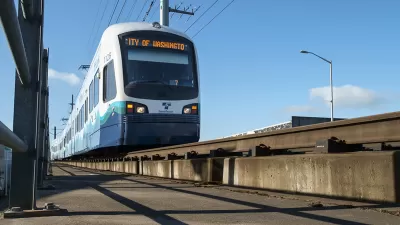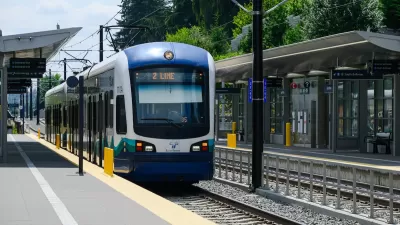Sound Transit claims maintenance work is necessary to prepare for upcoming transit extensions, but critics question the need to make drastic service cuts.

Maintenance projects planned by the Seattle area’s Sound Transit could cause major disruptions in service over the next several months. As Stephen Fesler writes in The Urbanist, “The planned service disruptions in July and in the fall will reduce Link frequencies to 20 minutes. This equates to a 53% reduction during peak periods and about 50% during off-peak periods.”
Fesler argues that while maintenance work makes sense in light of the transit extensions slated to open in the next few years, “it’s clear that the service disruptions do not need to be as severe as the agency is planning, and that raises the specter of major service disruptions for modest maintenance work becoming routine.”
Fesler lists the schedule and impacts of planned service disruptions, pushing back on some of the agency’s more questionable decisions, such as choosing to go single-track or not considering using crossover tracks to maintain service while work is occuring. According to Fesler, the announcement came without meaningful community engagement and with little explanation of the plan to the agency’s board. “Ultimately, Sound Transit’s Future Ready service disruptions are the result of agency staff deciding in favor of a blunt tool of simplicity to complete maintenance work, not one of necessity.”
FULL STORY: Sound Transit Decrees ‘Tile-mageddon’ Service Disruptions Due to Maintenance Work

Alabama: Trump Terminates Settlements for Black Communities Harmed By Raw Sewage
Trump deemed the landmark civil rights agreement “illegal DEI and environmental justice policy.”

Planetizen Federal Action Tracker
A weekly monitor of how Trump’s orders and actions are impacting planners and planning in America.

Why Should We Subsidize Public Transportation?
Many public transit agencies face financial stress due to rising costs, declining fare revenue, and declining subsidies. Transit advocates must provide a strong business case for increasing public transit funding.

Understanding Road Diets
An explainer from Momentum highlights the advantages of reducing vehicle lanes in favor of more bike, transit, and pedestrian infrastructure.

New California Law Regulates Warehouse Pollution
A new law tightens building and emissions regulations for large distribution warehouses to mitigate air pollution and traffic in surrounding communities.

Phoenix Announces Opening Date for Light Rail Extension
The South Central extension will connect South Phoenix to downtown and other major hubs starting on June 7.
Urban Design for Planners 1: Software Tools
This six-course series explores essential urban design concepts using open source software and equips planners with the tools they need to participate fully in the urban design process.
Planning for Universal Design
Learn the tools for implementing Universal Design in planning regulations.
Caltrans
Smith Gee Studio
Institute for Housing and Urban Development Studies (IHS)
City of Grandview
Harvard GSD Executive Education
Toledo-Lucas County Plan Commissions
Salt Lake City
NYU Wagner Graduate School of Public Service





























